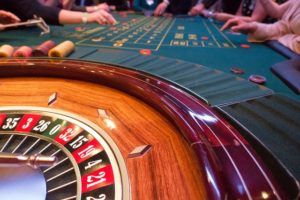Who’s Crazy Now? Roulette strategy says fewer wagers are better.
 I’ve come across a lot of roulette strategies in my time as an online gambler and archiver. I can tell you right off the bat, none of them are going to give you a positive expectation. Roulette isn’t like blackjack or poker, where a player with enough skill can turn the tides in their favor. Blackjack requires intense concentration and card counting (eligible in a land casino only), and poker, because it’s not house-banked, simply requires you to be a better player than those around you.
I’ve come across a lot of roulette strategies in my time as an online gambler and archiver. I can tell you right off the bat, none of them are going to give you a positive expectation. Roulette isn’t like blackjack or poker, where a player with enough skill can turn the tides in their favor. Blackjack requires intense concentration and card counting (eligible in a land casino only), and poker, because it’s not house-banked, simply requires you to be a better player than those around you.
Strategies for roulette only come in a few very basic varieties. There are those based on betting systems, wherein a player makes a profit – albeit a minimal one – so long as they can avoid a lengthy streak of losses. Then there are those that simply require the bettor to stick to bets with the highest return to player (RTP). As I said, neither can possibly offer a positive expectation, but common sense might make even the craziest bettors smarter than a lot of people have given them credit for.
Maybe These Roulette Bets Weren’t So Crazy?
If you recollect, we recently detailed the insane one-wager betting tactics of some extreme risk takers. In that article, entitled 3 Craziest Roulette Winners of All Time, our readers learned the tales of Chris Boyd, Ashley Revell and Jake Cody. They come from very different backgrounds – one a computer whiz who saved up for three years his time; one an impatient young man who sold everything he owned; the other a poker player with a big tournament win burning through his pocket. But they all have one very interesting thing in common. They each wagered a superfluous amount of money on a single roulette bet, and miraculously, they won!
Boyd struck gold for a $440,000 payout when he dropped his entire life savings on Red. Revell, inspired by Boyd’s story, but too impatient to save up, sold everything from his house and car to every strip of clothing he owned, also doubling up on Red for $271,600. Cody, having just won a UKCP poker tournament for £42,670 – and downing a few celebratory beers – was encouraged by his friends to bet it all on Black. He did, walking away with £85,340 for his trouble.
We call them crazy for risking so much money on what amounts to the flip of a coin. Not even the flip of a coin, since the odds were worse than 50/50. Boyd and Cody, playing by European Roulette rules, faced a house edge of 2.7%, which equates to 48.65/51.35. Revell placed his bet on American Roulette, putting him up against an even worse edge of 5.26% (47.37/52.63).
Common Sense Roulette Strategy Says They’re Not So Crazy After All
The way the house edge is set against you, as it is in the case of European Roulette (2.7%), you have a 48.65% chance of winning that bet and doubling your money. That’s pretty close to a 50/50 shot in a single spin of the wheel. If you take your time, slow betting in smaller increments, the house edge remains the same at 2.7%. Essentially, this number estimates that you’re going to lose 2.7% of your bet.
The difference between the two scenarios is variance. Variance is the factor that ensures mathematical probabilities will catch up with you in the long term. This means that you really do have a near 50/50 shot of winning that one enormous bet. But if you make a large number of small bets, you’re more likely to lose overall.
What I’m getting at here is that if Boyd had wagered his entire $220,000 slowly at $1000 per bet, odds are he would have lost about $6,000, and been left with $214k. He’d still have money, but less than he started with. The chance that he would continue betting and winning long enough to double his money was next to impossible. However, by taking one huge risk on one monumental wager, his chance of doubling his money was actually much greater.
I’m certainly not recommending that anyone follow in the footsteps of Chris Boyd—most definitely not Ashley Revell. But you have to admit, when taking basic roulette strategy into account, their rationalization of those bets were not so insane after all.









